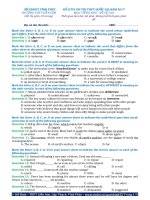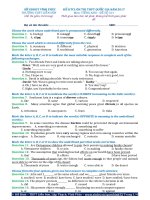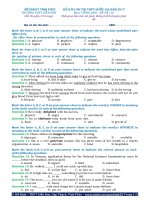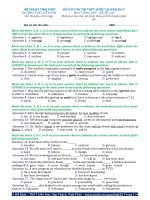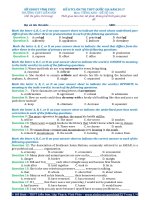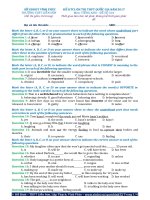- Trang chủ >>
- Văn Mẫu >>
- Văn Kể Chuyện
GCSE MOCK TESTS 326
Bạn đang xem bản rút gọn của tài liệu. Xem và tải ngay bản đầy đủ của tài liệu tại đây (70.42 KB, 5 trang )
SƠ GD&ĐT VINH PHUC
TRƯƠNG THPT LIÊN SƠN
(Đề thi gồm: 05 trang)
ĐỀ KTCL ƠN THI THPT QUỐC GIA NĂM 20172018
Mơn: TIẾNG ANH – ĐÊ SỐ 326
Thời gian làm bài: 60 phút, không kể thời gian phát
đề
Ho va tên thi sinh:……………………………………………………………………. SBD:…………………………
Mark a letter A, B, C, or D on your answer sheet to indicate the word whose underlined part
differs from the offer three in pronunciation in each of the following questions.
Question 01:
A. rained
B. jumped
C. arrived
D. followed
Question 02:
A. tea
B. leather
C. leave
D. lead
Mark the letter A, B, C, or D on your answer sheet to indicate the word that differs from the
other three in the position of primary stress in each of the following questions.
Question 03:
A. category
B. unbelievable
C. popularity
D. university
Question 04:
A. begin
B. visit
C. open
D. offer
Mark a letter A, B, C, or D on your answer sheet to show the underlined part that needs
correction in each of the following questions.
Question 05: There are many different ways of comparing the culture of one nation
with those of another.
A. There are
B. of comparing
C. those
D. another
Question 06: She only had a twenty-dollars bill with her when she landed at Heathrow airport.
A. had
B. twenty-dollars bill
C. when
D. at
Question 07: I was very busy lately since the project of designing the new collection started
A. was
B. since
C. the project
D. the new collection
Mark the letter A, B, C, or D on your answer sheet to indicate the correct answer to each of the
following questions.
Question 08: The weather was very nice, so he found________a raincoat with him.
A. it necessary taking
B. it unnecessary taking
C. unnecessary to take
D. it unnecessary to take
Question 09: Jack can speak two languages. One is English ________is Vietnamese.
A. Other
B. The other C. Another
D. Others
Question 10: Since drinking water is a ________resource, we should let children know how precious it
is, and teach them to conserve it.
A. limitless B. limited
C. limiting
D. limitation
Question 11: Many people________that natural resources will never be used up.
A. view
B. consider C. consider D. regard
Question 12: My boss’s plane________at 10:15 tomorrow morning, but I cannot pick him up.
A. arrives
B. is arriving C. will be arrriving D. arrived
Question 13: If you________less last night, you________so bad today.
A. had drunk- would not have felt B. drank- would not feel
C. had drunk- would not feel
D. would have drunk- would not feel
Question 14: The police have just found the man and his car________were swept away during the
heavy storm last week.
A. that B. which
C. whose
D. when
Question 15: The accident is said to have resulted from________ driver’s careless driving and thick fog
in that morning.
A. a/ the
B. the/0
C. a/a
D. the/ the
Question 16: Scientists have discovered a close________ between smoking and several serious
diseases
A. union
B. connection
C. action
D. combination
Question 17: I’ll lend you the money and you________ pay me back till next month.
A. needn’t
B. mustn’t
C. need
D. must
Question 18: The man was said to________ lung cancer.
A. die by
B. die of
Question 19: ________ long it takes, I will wait for you.
A. However
B. But
Mark the letter A, B, C, or D on your answer sheet
complete each of the following exchanges.
Question 20: Peter: “My mother’s much better now.”
A. Oh, I’m pleased to hear it
C. Oh, really? The doctor must be very good
Question 21: Tom: “Can I bring a friend to your party?”
A. The more the merrier
B. That’s right
C. die at
D. die out
C. So
D. Therefore
to indicate the most suitable response to
– Kyle: “________________”.
B. Wonderful! Congratulation
D. Good news for you
– Mary: “________________”.
C. you’re welcome D. Straight away
Mark the letter A, B, C, or D on your answer sheet to indicate the word(s) OPOSITE in meaning
to the underlined word(s) in each of the following questions.
Question 22: No one likes Jame because he always looks down on them.
A. praises
B. admires
C. respects
D. feels superior to
Question 23: Because we know nothing, in this view, we should treat all things with indifference
and make no judgments.
A. reconciling ourself to something
B. becoming annoyed very easily
C. feeling totally different from other people
D. showing interest in something
Mark the letter A, B, C, or D on your answer sheet to indicate the word(s) CLOSEST in meaning
to the underlined word(s) in each of the following questions.
Question 24: The Bali Tiger was declared extinct in 1937 due to hunting and habitat loss.
A. reserve
B. generation
C. natural environment
D. diversity
Question 25: The shoplifter immediately admitted to her crime to the security guard.
A. agreed
B. pleased
C. denied
D. confessed
Mark the letter A, B, C, or D on your answer sheet to indicate the sentence that is closest in
meaning to each of the following questions.
Question 26: Due to the fact that the demand for tea was very high in the 19th century, its price
increased much.
A. It was not until the 19th century that the demand for tea started to increase.
B. It was its price which decreased the demand for tea in the 19th century.
C. In the 19th century the price for tea didn’t increase despite the demand.
D. The demand for tea was so high in the 19th century that its price increased much
Question 27: People say that he was a successful painter.
A. He is said to have been a successful painter
B. He is said to be a successful painter
C. It is said him to have been a successful painter.
D. It was said that he was a successful painter
Question 28: "It is a surprising gift. Thank you very much, Mary," said Mr. Pike.
A. Mr. Pike promised to give Mary a surprising gift.
B. Mr.Pike thanked Mary though he did not really like gift.
C. Mr. Pike thanked Mary for the surprising gift.
D. Mr. Pike congratulated Mary on the surprising gift.
Mark a letter A, B, C, or D on your answer sheet to indicate the sentence that best combines
each pair sentences in the following questions.
Question 29: Marie Curie was a famous mathematician and physicist. She also won the Nobel Prize for
chemistry.
A. Winning the Nobel Prize for chemistry, Marie Curie became a famous mathematician and
physicist.
B. Marie Curie was a famous mathematician rather than physicist although she won the
Nobel Prize for chemistry
C. Marie Curie, a famous mathematician and physicist, also won the Nobel Prize for
chemistry
D. Marie Curie won the Nobel Prize for chemistry so she was a famous mathematician and
physicist.
Question 30: Jack was overconfident. Therefore, he ruined our plan completely.
A. That was Jack’s overconfidence ruined our plan completely
B. Jack was overconfident, which ruined our plan completely
C. It was because Jack’s overconfidence that ruined our plan completely
D. It was Jack’s overconfidence ruined our plan completely
Read the following passage and mark the letter A, B, C, or D on your answer sheet to indicate
the correct word or phrase that best fits each of the numbered blanks from 31 to 35.
The Rocky Mountains run almost the length of North America. They start in the North-west,
but lie only a (31)________ hundred miles from the center in more southern areas. Although the
Rockies are smaller (32)________ the Alps, they are no less wonderful.
There are many roads across the Rockies, but the best way to see them is to travel by train.
You start from Vancouver, the most attractive of Canada's big cities. Standing with its feet in the
water and its (33)________ in the mountains, this city (34)________ its residents to ski on slopes just 15
minutes by car from the city centre.
Thirty passenger trains a day used to (35)________ off from Vancouver on the cross-continent
railway. Now there are just three a week, but the ride is still a great adventure. You sleep on board,
which is fun, travel through some of the best scenery at night.
Question 31:
A. few
B. many
C. couple
D. lot
Question 32:
A. from
B. to
C. as
D. than
Question 33:
A. ear
B. head
C. hand
D. nose
Question 34:
A. lets
B. allows
C. gives
D. offers
Question 35:
A. set
B. get
C. leave
D. take
Read the following passage and mark the letter A, B, C, or D on your answer sheet to indicate
the correct answer to each of the questions.
It is commonly believed in the United States that school is where people go to get an
education.
Nevertheless, it has been said that today children interrupt their education to go to school. The
distinction between schooling and education implied by this remark is important.
Education is much more open-ended and all-inclusive than schooling. Education knows no bounds.
It can take place anywhere, whether in the shower or on the job, whether in a kitchen or on a
tractor. It includes both the formal learning that takes place in schools and the whole universe of
informal learning. The agents of education can range from a revered grandparent to the people
debating politics on the radio, from a child to a distinguished scientist. Whereas schooling has a
certain predictability, education quite often produces surprises. A chance conversation with a
stranger may lead a person to discover how little is known of other religions.
People are engaged in education from infancy on. Education, then, is a very broad, inclusive
term. It is a lifelong process, a process that starts long before the start of school, and one that should
be an integral part of one's entire life.
Schooling, on the other hand, is a specific, formalized process, whose general pattern varies
little from one setting to the next. Throughout a country, children arrive at school at approximately
the same time, take assigned seats, are taught by an adult, use similar textbooks, do homework, take
exams, and so on. The slices of reality that are to be learned, whether they are the alphabet or an
understanding of the workings of government, have usually been limited by the boundaries of the
subject being taught. For example, high school students know that they are not likely to find out in
their classes the truth about political problems in their communities or what the newest filmmakers
are experimenting with. There are definite conditions surrounding the formalized process of
schooling.
Question 36: What is the main idea of the passage?
A. The best school teach a wide variety of subjects
B. Education and schooling are quite different experiences
C. Students benefit from schools, which require long hours and homework
D. The more years students go to school, the better their education is
Question 37: What does the author probably mean by using the expression children interrupt their
education to go to school?
A. Going to several different schools is educationally beneficial.
B. School vacations interrupt the continuity of the school year.
C. Summer school makes the school year too long.
D. All of life is an education.
Question 38: The word chance in the second paragraph is closest in meaning to________.
A. unplanned
B. unusual
C. lengthy
D. lively
Question 39: The word an integral in the second paragraph is closest in meaning to________.
A. an equitable
B. a profitable
C. a pleasant
D. an essential
Question 40: The word they in the third paragraph refers to________.
A. slices of reality
B. similar textbooks
C. boundaries
D. seats
Question 41: The passage supports which of the following conclusions?
A. Without formal education, people would remain ignorant.
B. Education systems need to be radically reformed.
C. Going to school is only part of how people become educated.
D. Education involves many years of professional training.
Question 42: The writer seems to agree that________.
A. Schooling is as important than education
B. Education is not as important as schooling
C. Schooling is unlimited and more informal
D. Education is more influential than schooling
Read the following passage and mark the letter A, B, C, or D on your answer sheet to indicate
the correct answer to each of the questions.
The ideas of John Dewey, philosopher and educator, have influenced American thought for
over one hundred years. Dewey was born in Vermont in 1859, and throughout hi life he kept the
respect for experience, individuality, and fair play that shaped the character of the nineteenth
century Vermonter. He viewed his own life as a continuously reconstructive process with experience
and knowledge building on each other.
By the 1930s, Dewey had simplified his theory of experience to its essence. As the
intellectual leader of the progressive schools, he asserted that there was danger in rejecting the old
unless the new was rooted in a connect idea of experience. He held that experience is an interaction
between what a person already knows and the situation at hand. Previous knowledge interacting
with the present environment influences future experience.
Dewey believed that experience could not be equated with education because all experiences
as not necessarily educative. Experience is educative only when it contributes to the growth of the
individual, but it can be miseducative if it distorts the growth of further experience. It is the quality
of experience that matters. Thus, productive experience is both the means and the goal of education.
Furthermore, since education is a social process, truly progressive education involves the
participation of the learner in directing the learning experience.
During his long life, Dewey lectured and published prolifically. These writings were
influential both during his lifetime and after his death at the age of ninety-two. He viewed his whole
life as an experiment which would produce knowledge that would lead to further experimentation.
The range and diversity of Dewey’s writings and his influence on society place him among
American’s great thinkers.
Question 43: What does the passage mainly discuss?
A. John Dewey’s professional growth
B. John Dewey’s theory of experience
C. the progressive movement in education
D. the educational methods of John Dewey
Question 44: The author implies that Dewey’s Vermont background________.
A. inspired him to become a philosopher
B. limited the type of experiences he had as a child
C. the progressive movement in education
D. provided him with an excellent education
Question 45: The word “its” in paragraph 2 refers to________.
A. the 1930s
B. progressive education
C. theory of experience
D. the old
Question 46: According to John Dewey, the interplay between a person’s previous knowledge and
the present situation is________.
A. dangerous
B. a correct idea of experience
C. education
D. a rejection of the old
Question 47: The word “distorts” in paragraph 3 refers to________.
A. deforms
B. balances
C. stimulates
D. mislays
Question 48: All of the following were part of Dewey’s theory of experience and education
EXCEPT________.
A. knowledge and experience interact
B. experience should develop the individual
C. experience is always educative
D. present experience affects future experience
Question 49: According to Dewey, progressive education should include________.
A. both positive and negative experience
B. directing new social processes
C. complete rejection of traditional methods
D. the active participation of the student
Question 50: The word “prolifically” in paragraph 4 is closest in meaning to________.
A. carefully
B. progressively
C. intellectually
D. abundantly
_________THE END_________
